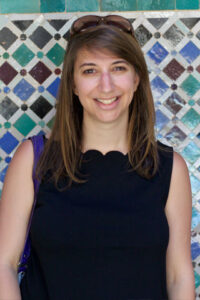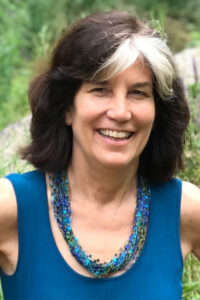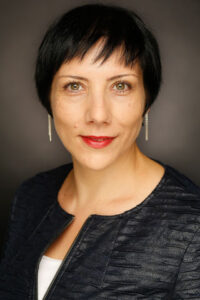|
|
We have four fellows joining us in the Research Center this spring. Please join us in welcoming Isabel Oleas-Mogollón, Ariel Fein, Louisa Wood Ruby, and Lisa Regazzoni. Each of our fellows will present their research in the Brown Bag Lunch series. Join us to learn more.
|
|
|
|

Isabel Oleas-Mogollón
Fields of the Future Research Fellow, Spring 2022
Isabel Oleas-Mogollón is an independent scholar of the history of Spanish American art and visual and material culture with an emphasis in the Audiencia of Quito. Her scholarly work focuses on post-colonial theory, religious patronage, and gender and has been published in Religion and the Arts, Latin American and Latinx Visual Culture, and Hemisphere: Visual Cultures of the Americas. She is currently working on her first book project, Imperial Power and Christian Triumph, which examines the agency of reflective surfaces and their function in shaping imperial discourses, supporting institutional agendas, and in structuring private and public religious expressions. Besides providing an overview of eighteenth-century Andean religious visual culture and its reliance on reflective surfaces, the book argues that reflective surfaces enhanced the devotees’ emotional connection with Christian images and prompted curated forms of spiritual development and social interaction.
Esplendor y Lucimiento: Mirrors and Triumphal Language in Eighteenth-Century Quito (January 27)
|
|

Ariel Fein
Fields of the Future Research Fellow, Spring 2022
Ariel Fein received her PhD in Byzantine and Islamic art history from Yale University. Her scholarship explores the intersection of Christian and Islamic visual cultures, in particular the circulation of objects, peoples, and ideas across the frontier zones of the medieval Mediterranean. She is currently working on two projects. Her book project, Emir of Emirs: George of Antioch and the Shaping of Norman Visual Culture, examines the complex multi-visual culture of Norman Palermo, and in particular the Arab-Christian built environment, through the life and patronage of grand vizier George of Antioch. A second project, Fatimid Wood Networks: Circulation, Production, and Consumption, considers how Fatimid objects were conceived, perceived, and experienced in Egypt and the Maghreb. Other research interests include the arts of medieval Arab-Christians, identity negotiation and cultural memory in the post-Byzantine diaspora, and Jewish ceremonial art and architecture, with a particular focus on the Jewish communities of the nineteenth- and twentieth-century Middle East. She held the 2020–21 Jane and Morgan Whitney Fellowship in the Islamic Art Department at the Metropolitan Museum of Art and is the 2020–21 recipient of the Frances Blanshard Dissertation Prize from the History of Art Department at Yale University.
|
|

Louisa Wood Ruby
Visiting Fellow, Spring 2022
Louisa Wood Ruby is head of research at the Frick Art Reference Library where she has been in charge of the Center for the History of Collecting, the Digital Art History Lab, and the Scholars’ Program. A specialist in Dutch and Flemish art, she has published a catalogue raisonné of the drawings of Paul Bril; numerous articles in journals such as Master Drawings, Burlington Magazine, and the Journal of Historians of Netherlandish Art; and contributed essays to several symposia proceedings and festschrifts. Her interest in the art collections of the early Dutch in New Netherlands/New York emerged in 2008 with her article “Dutch Art and the Hudson Valley Patroon Painters” published in Joyce Goodfriend’s volume Going Dutch: The Dutch Presence in America 1609–2009 and continued in 2014 with her essay, “Pictures Painted Chiefly in Oils, on Boards: Collecting Dutch Art in Colonial New York,” in the Frick Collection Studies in the History of Art Collecting in America, volume 1: Holland’s Golden Age in America: Collecting the Art of Rembrandt, Vermeer, and Hals. In 2019–20, she co-curated and wrote the catalogue for the exhibition Jan Brueghel the Elder: A Magnificent Draughtsman, held at the Snijders & Rockoxhuis museum in Antwerp. Most recently, she contributed “A Family Affair: Bruegel and Sons in America,” to the Frick’s publication, America and the Art of Flanders: Collecting Paintings by Rubens, Van Dyck, and Their Circles, and “Provenance Initiatives Emerging within the Digital Humanities,” for the book, Provenance Research Today: Principles, Practice, Problems, published by Lund Humphries.
Colonial Dutch “She-Merchants” as Collectors (March 21)
|
|

Lisa Regazzoni
Visiting Fellow, Spring 2022
Lisa Regazzoni is professor of theory of history at the University of Bielefeld. She studied philosophy at the universities of Bologna and Heidelberg and earned a PhD in philosophy at the University of Potsdam in 2006. After several fellowships in Paris (Centre Alexandre Koyré, German Historical Institute Paris, École des hautes études en sciences sociales), in London (German Historical Institute), and Princeton (Institute for Advanced Study), she was appointed professor of modern history at Goethe University in Frankfurt in 2019. Her teaching and research interests include theory and history of historiography from the early modern period, scientific and academic collecting, and the historical epistemology and methodology of history with particular attention to the knowledge potential of materiality and things of the past. She addresses this topic in her most recent book Geschichtsdinge. Gallische Vergangenheit und französische Geschichtsforschung im 18. und frühen 19. Jahrhundert (Things of History: Gallic Past and French Historical Research in the Eighteenth and Early Nineteenth Century), which was published in 2020.
How Can a Gathering of Things Be Transformed into a Scientific Collection? Experimenting with Reinhart Koselleck’s Material Estate (March 28)
|
|
COPY AND PASTE CODE BELOW TO MAILCHIMP
|